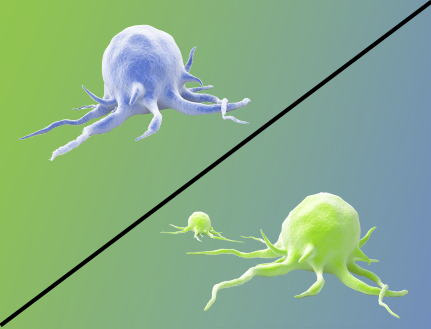
Popular topics

-
References
Lodish H et al. (2000). Molecular Cell Biology, 4th edition. New York: W. H. Freeman; 2000.
NHS UK. Predictive gene tests for cancer risk genes.
Available here (Accessed: June 08, 2015).
Inheriting mutant tumor suppressor genes increases your risk for cancer

Cancer is a complex multi-factorial disease; its development is triggered by a combination of genetic and environmental factors. Important hereditary factors include mutations in seven distinct protein groups that encompass proto-oncogenes, tumor suppressor genes, and DNA damage repair components.
What are oncogenes?
Most oncogenes are activated via point mutations, gene amplifications and gene translocations in a proto-oncogene. This results in altered gene expression or protein activity levels (Lodish et al. 2000). However, mutations to another group of proteins, known as tumor suppressors, also play an important role in the development of various cancer types. Mutant tumor suppressor genes are recessive, and therefore both alleles need to be mutated in order to trigger tumor development (in most cases the protein expressed by the unaffected allele is sufficient to control cell growth). This phenomenon has been described by the American geneticist Alfred Knudson under the term “multiple-hit hypothesis”; it suggests that while inheriting one faulty allele will predispose an individual to cancer further “hits” or mutations to the second functioning allele are required to trigger cancer onset.
Predicting risk
The inheritance of certain mutant tumor suppressor alleles, such as breast cancer 1, early onset (BRCA1) and breast cancer 2, early onset (BRCA2) mutant alleles, significantly increase the risk of developing breast and ovarian cancers. Actress Angelina Jolie recently made headlines for undergoing preventive surgery after having tested positive for carrying a BRCA gene mutation. Jolie expressed that her mother died of ovarian cancer, while her grandmother and aunt died of breast cancer. A female carrying a mutant BRCA1 allele has a 60-90% lifetime risk of developing breast and a 40-60% risk of developing ovarian cancer (NHS UK). In light of these increased risks, robust predictive genetic tests have been developed and are available to those, who have a family history of early onset breast cancer. Genetic tests to identify aberrant BRCA1 and BRCA2 genes are currently available via the NHS for patients with a relative diagnosed with cancer and a confirmed mutation. Individuals can also get tested by paying for private health care typically costing £500- £2000 (~$780-$3100). If the test is positive, preventive breast and ovarian surgery should be considered.
So although cancer is not usually the result of one crucial factor, such as genetics, research is identifying more genes responsible for increased cancer predisposition. For breast, prostate and ovarian cancers over 100 new mutant genes have been discovered in recent times by researchers (one great resource for staying up-to-date with the latest identified mutations is the Catalog of Somatic Mutations In Cancer (COSMIC) hosted on the Wellcome Trust Sanger Institute website; http://cancer.sanger.ac.uk/cosmic/). This information is a great asset for developing new cancer treatments and designing novel genetic tests. These tests will allow individuals with positive results to manage their risks of developing cancer through surgery, life style changes and regular check-ups.
Interested in cancer research?
Bio-Rad offers a variety of antibodies and proteins for the analysis of oncoproteins and tumor suppressor proteins by ELISA, Flow Cytometry, Immunofluorescence, Immunohistochemistry and Western Blotting.
References
Lodish H et al. (2000). Molecular Cell Biology, 4th edition. New York: W. H. Freeman; 2000.
NHS UK. Predictive gene tests for cancer risk genes.
Available here (Accessed: June 08, 2015).
You may also be interested in...
















